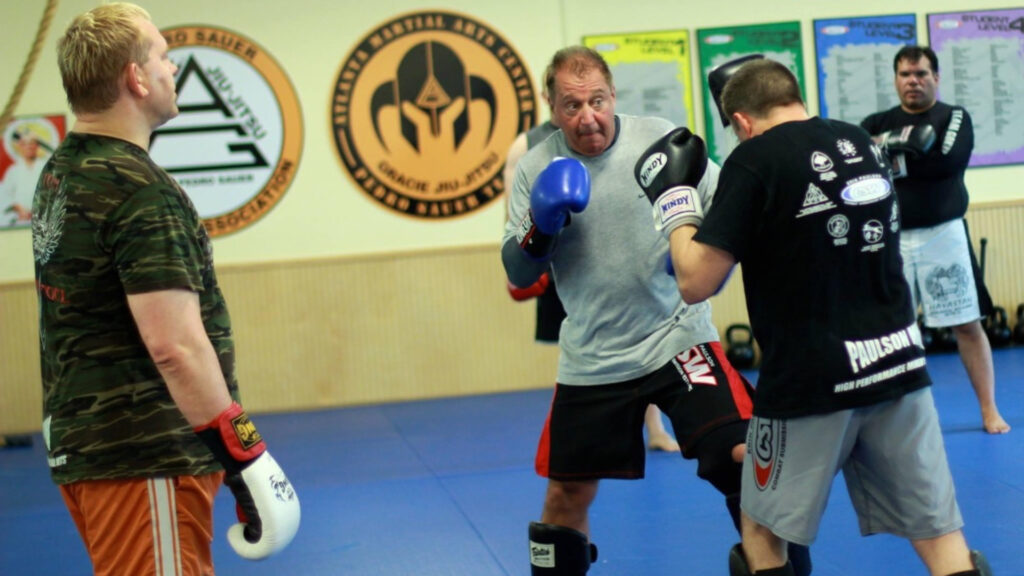
Everyone encounters problems in life. Whether personal, professional, or a blend of both, challenges are a natural part of the human experience. Yet, how we deal with these problems can significantly affect our overall well-being and success. Adopting a resilient mindset and a no-nonsense approach to challenges can be transformative.
For me, dealing with problems is akin to sparring in Thai Boxing. Imagine a rigorous training session lasting an hour or more, primarily focusing on sparring. During that time, you’ll inevitably take numerous hits to the face and kicks to the legs. It’s a relentless barrage that can quickly become overwhelming if you let it.
In the heat of sparring, you’ll lose sight of the bigger picture if you become overly focused on one punch to the face or one kick to the leg. While you’re fixated on the sting of that last hit, another blow will undoubtedly land, further disorienting you. This is where the essence of resilience comes into play. You have to let the hits bounce off you, much like bullets deflecting off the armor of a tank. The key is to maintain a calm and composed interior, even as the exterior is taking a beating. This mental fortitude lets you stay focused on your strategy and planning your next move. Instead of getting bogged down by the pain of each individual strike, you need to keep your mind clear and your body responsive.
In a good sparring session, the goal isn’t just to endure the hits but to learn from them and retaliate effectively. Every punch and kick is a learning opportunity, a chance to refine your technique and enhance your defensive and offensive strategies. Similarly, in life, every problem or setback is a chance to grow and improve. If you dwell on each setback, you lose the momentum needed to navigate the next one. Being calm inside means maintaining inner peace and clarity that allows you to assess the situation without emotional interference. It’s about having a resilient mindset that doesn’t crumble under pressure. This calmness is crucial for making strategic decisions amid chaos, whether in the ring or in everyday life.
By adopting a mindset where you let minor setbacks roll off while staying calm and planning your next steps, you can handle life’s challenges more effectively. Just like in sparring, where you become a better fighter through practice and experience, you become more adept at managing problems through continuous learning and adaptation in life.
Roll It Off and Drive Forward
When faced with adversity, the first step is to roll it off. This thought tool means not letting the problem consume you. Easier said than done, right? However, the concept is simple: acknowledge the issue but don’t dwell on it. Dwelling on problems can lead to a cycle of negativity that hampers progress.
Imagine a professional athlete who, after a poor performance, chooses to focus on their mistakes rather than their next game. This mindset is counterproductive. Instead, athletes who excel learn from their setbacks, quickly shift their focus to the next challenge and drive forward with renewed determination.
Don’t Let It Get in Your Head
One of the most significant barriers to overcoming problems is allowing them to occupy too much mental space. When we let problems get into our heads, they can become larger than they are, negatively influencing our thoughts, emotions, and behaviors. This mental occupation can lead to stress, anxiety, and a reduction in cognitive function, all of which are detrimental to solving the issue at hand.
Practicing mindfulness is a practical approach to prevent problems from getting into your head. Mindfulness involves staying present and fully engaging with the current moment. Focusing on the now can prevent your mind from wandering into a maze of “what ifs” and “should haves.” This mental clarity is crucial for effective problem-solving and maintaining a positive outlook.
Frustration Only Clouds the Mind
Frustration is a natural response to obstacles but is also one of the most unproductive emotions. When frustration sets in, it clouds the mind, making it difficult to think clearly and make rational decisions. It can lead to impulsive actions and exacerbate the problem rather than resolve it.
To manage frustration, it’s crucial to recognize its onset and use effective strategies to alleviate it. Deep breathing, taking a short walk, or engaging in quick physical activities can help diffuse immediate frustration. Additionally, practicing gratitude by focusing on the positive aspects of your life can shift your attention from what’s going wrong to what’s going right. For me, the most effective of these strategies is breath control. Mastering your breath lets you clear and control your mind, with everything else falling into place. This is why I often say, “The breath is the bridge” to control.
Self-Doubt Only Clouds the Mind
Similar to frustration, self-doubt can be a significant impediment to overcoming problems. When you doubt your abilities, you undermine your potential to find solutions. Self-doubt can create a vicious cycle where the fear of failure prevents you from taking necessary actions, thus leading to actual failure.
Building self-confidence is a critical step in eliminating self-doubt. Start by acknowledging your past successes and the skills you have developed over time. Surround yourself with supportive people who believe in your abilities. Setting small, achievable goals can boost your confidence as you tick off each accomplishment.
If You Let It Control Your Mind, You Will Be Stuck Longer
Allowing problems, frustration, and self-doubt to control your mind will inevitably lead to stagnation. The longer you stay stuck in negative thought patterns, the more difficult it becomes to break free. This mental paralysis prevents you from taking action and moving forward.
To avoid getting stuck, it’s crucial to develop a proactive mindset. Focus on what you can control and take incremental steps towards resolution. Celebrate small victories along the way to maintain momentum and stay motivated. Remember, progress, no matter how small, is still progress.
Get Around It and Focus on the Now
The final step in overcoming problems is to get around them and focus on the now. This means adopting a forward-thinking approach and refusing to be held back by past or present challenges. By concentrating on the present moment, you can make the best decisions for your current situation and set the stage for future success.
Here are some practical tips to help you focus on the now:
1. Set Clear Goals: Having a clear vision of what you want to achieve can keep you grounded and focused on the present. Break down your goals into manageable tasks and tackle them one at a time.
2. Practice Mindfulness: Engage in mindfulness exercises such as meditation, yoga, or mindful walking. These practices help train your mind to stay present and reduce the impact of negative thoughts.
3. Stay Positive: Maintain a positive attitude by surrounding yourself with positive influences and engaging in activities that bring you joy. Positive thinking can significantly improve your ability to cope with and overcome problems.
4. Seek Support: Don’t hesitate to contact friends, family, or a Mentor for support. Sometimes, talking out your problems can provide a new perspective and help you find solutions.
5. Take Action: The most crucial step is to take action. Procrastination can lead to increased stress and a sense of helplessness. You can see progress and regain control over your situation by taking decisive action. Taking action gets you off the proverbial “X” and will also help you deal with fear. Tuhon Tim Waid says that fear grows in an immobile environment. As soon as you start driving forward to your target, there is no room for fear.
Life is full of challenges, but how we respond to them defines our path forward. By adopting a resilient mindset and focusing on the present, we can overcome obstacles and drive towards our goals. Remember, the key is not to let problems control your mind. Instead, roll them off, focus on the now, and keep moving forward. Frustration and self-doubt are natural but should be managed and minimized to maintain mental clarity and productivity. With determination and the right mindset, you can tackle any problem and become stronger on the other side.
Shift Your Perspective, Take the Action, Transform Your World.
~ Sifu Alan

Alan Baker is renowned for his dual expertise in crafting tailored Defensive Tactics Programs and high-performance coaching. Catering specifically to law enforcement agencies, military organizations, and security firms, Alan designs training regimens that emphasize practical techniques, real-world adaptability, and scenario-based training. His approach enhances the capabilities and readiness of personnel in intense situations. Explore Alan’s tailored programs here.
Beyond mere tactics, Alan stands out as the paramount “Self Leadership” coach, adept at unlocking the vast potential within individuals. With a deep passion for mentoring professionals, entrepreneurs, and those on personal growth odysseys, he focuses on nurturing a mindset of excellence. Alan’s coaching hinges on practical strategies that bolster mental resilience, focus, and drive. Teaming up with Alan means embarking on a transformative path where mental barriers are dismantled, inherent strengths come to the fore, and your goals become within clear sight. His profound insights enhance performance and sculpt a mindset tailored for triumphant success.
To delve deeper into Alan’s mindset philosophy, peruse his enlightening collection of books And if you’re ready to amplify your journey under Alan’s tutelage, connect through his official website.

